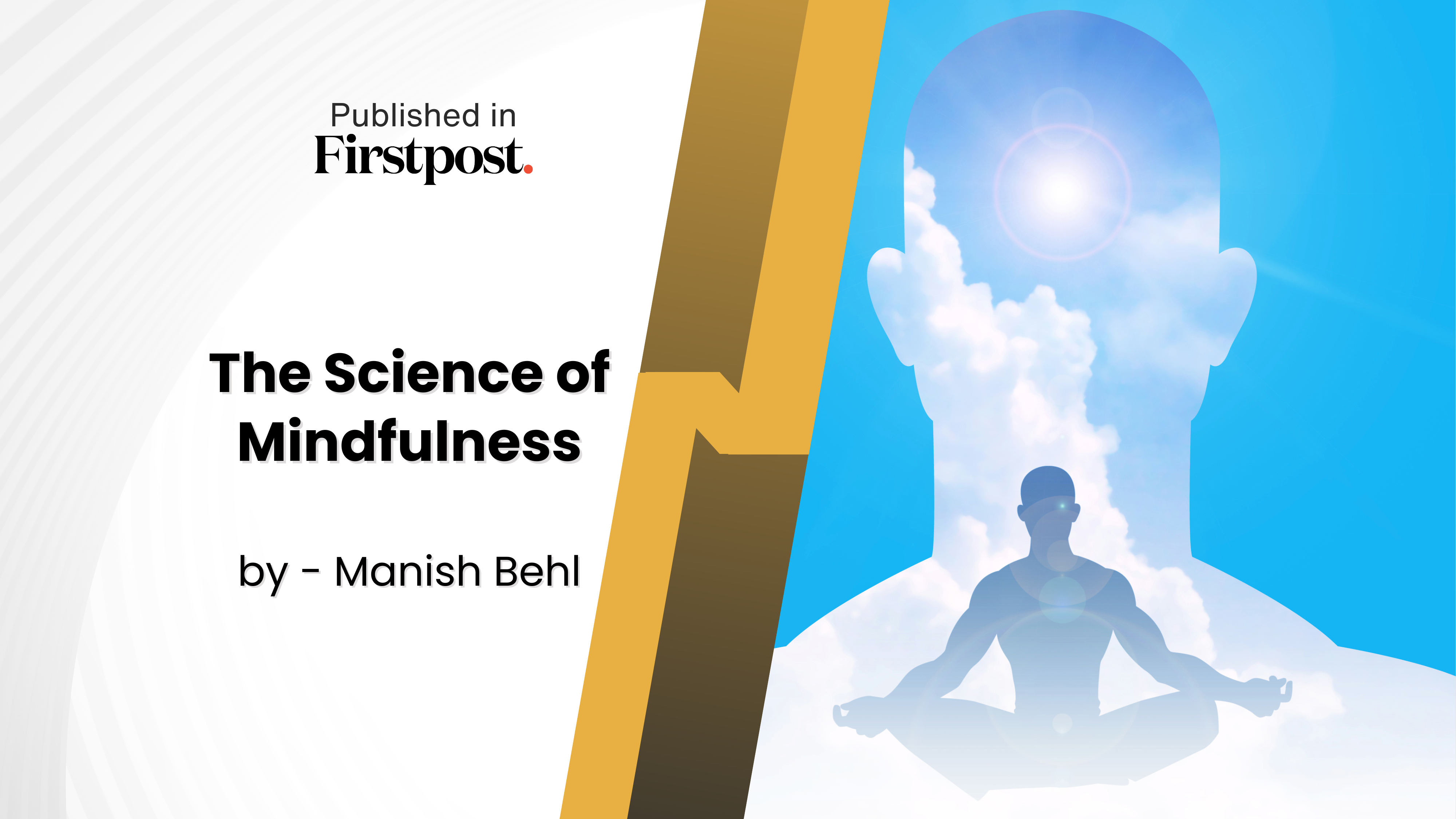The Science of Mindfulness: Proven Benefits beyond Meditation – By Manish Behl

+
The Science of Mindfulness: Proven Benefits beyond Meditation
Article By – Manish Behl and Published by The Firstpost
Embracing Change in a Rapidly Evolving World
Change is an inherent part of life; nothing remains static forever. The world around us is in a constant state of flux.
In recent years, however, the pace of change has accelerated dramatically. Words like “disruption” have become commonplace, and we now live in an era defined by volatility, uncertainty, complexity, and ambiguity. Digital advancements are reshaping humanity, pushing the boundaries of what we once thought possible, often in ways that exceed our understanding. Similarly, in our personal lives, the demands and complexities we face have grown significantly over the years.
Technologies such as augmented and virtual reality, artificial intelligence, brain-computer interfaces, genomics, and biological innovations are just glimpses of what human ingenuity can achieve in the future.
However, this rapid development comes at a cost. Issues like pollution, deforestation, the overuse of natural resources, animal exploitation, an aging population, poverty, disease, mental health crises, drug addiction, terrorism, and autonomous weapons of mass destruction are growing challenges. These problems are intensifying and may continue to do so at an even faster pace.
But are our physical, mental, emotional, psychological, and social capabilities evolving at the same speed? Amidst these changes, we all strive for a life that is healthier, less stressful, and more fulfilling. We aim to be more productive and happy. To navigate this increasingly complex world, humanity must adopt fresh perspectives and new approaches to living well and thriving in these transformative times. How we harness technological advancements and treat ourselves, each other, and our environment will shape the future of our existence.
The answer to navigating these challenges might lie in the timeless wisdom of mindfulness. This is why scholars, scientists, and thought leaders across the globe are delving deeply into the science of mindfulness—seeking insights into how it can help us adapt, grow, and thrive in a rapidly changing world.
But what is Mindfulness?
Mindfulness: A Timeless Practice of Presence
Mindfulness is an ancient wisdom rooted in Indian traditions and practiced by yogis and Zen masters for centuries. Originating from Buddhist meditation and Vedic teachings, its history stretches back thousands of years.
At its core, mindfulness is about living in the present moment, though it defies a single, definitive explanation. To truly grasp what mindfulness entails, one must engage in its practice.
Broadly speaking, mindfulness can be understood as “the art of directing one’s attention to the unfolding present moment with curiosity, openness, and acceptance, free from judgment or bias.” Key elements of mindfulness include:
Observing your thoughts, emotions, and actions without becoming entangled in them.
Cultivating awareness of your breath, body sensations, and surroundings.
Maintaining a connection between the mind, body, and self, even amidst distractions.
Intentionally focusing on the present rather than dwelling on the past or anticipating the future.
Mindfulness is the practice of observing your current state—your body, mind, and environment—without judgment. It encourages responding thoughtfully to present experiences, whether pleasant or challenging, rather than reacting impulsively.
In modern times, mindfulness has been extensively studied and refined by Western scientists and practitioners such as Dr. Jon Kabat-Zinn, Dr. Ronald Siegel, Dr. Richard Davidson, Sharon Salzberg, Dr. Daniel Goleman, and Dr. Cliff Saron, among others. Their work has popularized mindfulness as a tool for enhancing well-being, reducing stress, and improving overall efficiency.
Mindfulness-based stress reduction (MBSR) programs, developed through rigorous research, have successfully integrated meditation practices to help individuals manage stress and cultivate a healthier, more balanced approach to life. This ancient practice continues to prove its relevance in addressing modern challenges.
What science says on Mindfulness:
The Rising Scientific Interest in Mindfulness
In recent decades, the scientific community has shown an unprecedented level of interest in exploring mindfulness. Thousands of studies and research papers have been dedicated to understanding its various dimensions and benefits.
One key finding is that the human mind naturally drifts about 50% of the time—whether working, driving, relaxing at home, or even conversing with others. However, long-term mindfulness meditation practices have been shown to alter the brain’s physical structure. These changes include increased cortical thickness and altered neural pathways, which reduce mental distractions, enhance focus, improve emotional regulation, and bolster the immune system.
Mindfulness meditation also significantly impacts neural networks, strengthening synaptic connections in areas of the brain associated with attention, introspection, and sensory processing. Specifically, the prefrontal cortex and anterior cingulate cortex—the brain’s executive centers—show marked improvements. Research consistently supports that mindfulness meditation leads to measurable changes in attention, awareness, and emotional regulation, resulting in observable behavioral and neurobiological benefits. These changes in the brain are linked to more positive emotional states and better management of emotions.
Healthcare professionals and therapists increasingly recognize mindfulness as a powerful complement to medical treatments and psychotherapy. It accelerates healing and recovery in patients while fostering their personal growth and overall well-being.
Modern science defines mindfulness in various ways, including:
“A state of psychological freedom achieved when attention is calm, flexible, and unattached to any particular perspective.”
“A psychological state of heightened awareness, cultivated through specific practices, which influences the way we process information and shapes our overall disposition.”
This growing body of evidence highlights the transformative potential of mindfulness, both as a personal practice and as a scientifically validated tool for enhancing health and well-being.
Why Mindfulness is important now?
Breaking Free from Mental Overload with Mindfulness
Our habitual tendencies to worry, blame, and relentlessly pursue material gains are at the heart of much of our emotional and physical distress.
In the whirlwind of today’s fast-paced life, we are constantly exposed to distractions, unfulfilled desires, and the pulls of ego and sensory cravings. To counter this, the mind must be trained to resist the grip of such compulsions. This mental discipline involves breaking free from what I describe as obsessive or compulsive thought patterns. Since the mind is central to awareness, cultivating conscious presence—mindfulness—is essential.
Mindfulness practices and meditation are powerful tools for developing this discipline. They help train the mind to focus and manage cravings, enabling us to live with clarity and intention.
A key benefit of mindfulness is its capacity to help us calm our emotions and sharpen our focus. In moments of stress, confusion, or overwhelm, mindfulness serves as a stabilizing force, redirecting our attention to the present.
It’s important to understand that mindfulness doesn’t aim to suppress thoughts or clear the mind entirely. Instead, it encourages us to observe our reactions and automatic behaviors with curiosity and awareness, fostering greater self-control.
No matter the challenges we face, the ability to soothe a restless mind and focus our thoughts is invaluable. By practicing mindfulness, we can experience calm and clarity in a very tangible way.
Furthermore, mindfulness quiets the mental noise and biases that cloud our judgment. This clarity enhances strategic thinking and decision-making, allowing us to act with confidence and precision in any situation.
Why organisations are adopting Mindfulness?
Mindfulness: Transforming Individuals and Organizations
Organizations embracing mindfulness as a tool for growth are reaping significant benefits at both individual and organizational levels.
Prominent companies like General Mills, Aetna, and numerous Silicon Valley giants—Google, Salesforce, Microsoft, Apple, Facebook, LinkedIn, and Twitter, among others—have incorporated mindfulness training into their leadership frameworks. These programs aim to enhance employees’ mental clarity, decision-making abilities, overall well-being, and resilience against stress.
At its core, mindfulness empowers individuals to manage their thoughts and emotions by anchoring attention in the present moment. It encourages letting go of judgment—whether directed at oneself, others, or circumstances. For leaders, this practice cultivates the ability to pause during chaos, enabling thoughtful and conscious responses instead of impulsive reactions driven by ingrained habits.
In today’s world of constant information overload, relentless distractions, and mounting stress, mindfulness serves as an ideal solution to navigate and thrive amidst modern challenges.
About the Writer
Manish Behl, Global Leading Mindfulness Expert and founder of Mindfulness India Summit and Mindful Science Centre

Manish Behl is a world renowned Mindfulness, Emotional intelligence, meditation and Leadership expert, who helps leaders and organizations foster wisdom and well-being through Mindfulness, Emotional Intelligence and Neuroscience. He is the visionary founder of Mindfulness India Summit, Asia’s largest mindfulness and emotional intelligence summit, and Mindful Science Centre a mindfulness research, development and training institute.
He is ICF PCC coach with his 25 years of successful leadership experience as CEO of various leading multinational companies, he brings a unique blend of practical and experiential knowledge to his mindfulness workshops and leadership coaching.
He offers practical strategies for leadership transformation, which enhances leadership skills, increase performance, transform anxiety and negativity into calm and focus. He is also a TEDx speaker, a neuroscience enthusiast and a conscious thinker who inspires and empowers people to live their best lives. His workshops, talks and coaching facilitate physical and mental wellbeing, cultivate inner peace and fuels purpose and motivation.
Become a ICF Certified Mindfulness Trainer – Read More
Do you want to become Mindfulness Trainer? Join this global certification program

Stay connected through our Social media Mindful Science Centre
LinkedIn I Insta I Facebook I YouTube I Twitter I Soundcloud
Visit his social media for more tips from Manish Behl
LinkedIn | Insta | Facebook | Youtube | Twitter | Soundcloud
He can help you unlock your true potential and achieve your goals in life.
To get started, you can book a consultation session with him by contacting him at manish@mindfulsciencecentre.com or hello@mindfulsciencecentre.com
You can also call him at +91 9819029220 or +91 8104541438
Tags:#awareness #fpjarticle #freepressjournal #mindfulliving #mindfulnessexpert #mindfulnessindiasummit #mindfulsciencecentre Creativity emotionalintelligence gratitude leadership manish behl meditation mental health mental performance mind wandering Mindfulness Mindfulness Tips neuroscience patience peace thinking wandering mind







